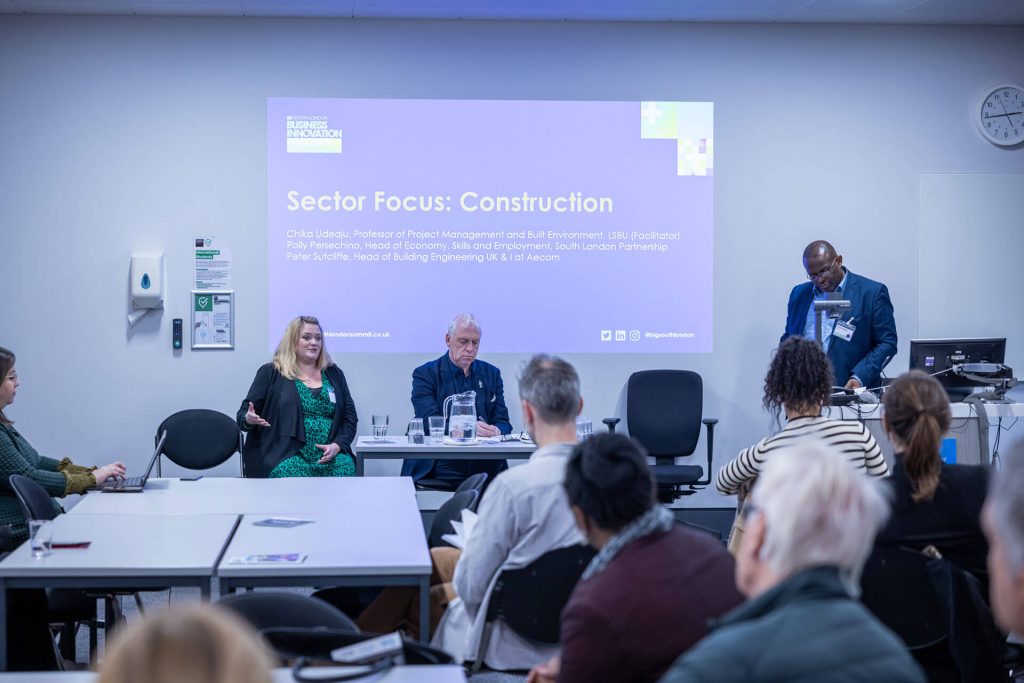Sector Focus: Construction
Panellists: Chika Udeaju, LSBU; Polly Persechino, South London Partnership; Peter Sutcliffe, Aecom
Collaboration and sustainability are key to the future of the construction sector.
Early collaboration between employers, educators, and skills practitioners, with an emphasis on sustainability training, will be key to bridging the skills gap and future-proofing the construction sector. These were the key messages from a sector-focused panel discussion exploring construction at the BIG South London Business Innovation Growth Summit on 29th November.
“There’s no industry that impacts the community the way construction does,” opened chair of the panel Prof. Chika Udeaja, Professor of Project Management & Construction at LSBU, detailing construction’s valuable contribution to the economy, as well as the wealth of “highly skilled and well-paid jobs” available within the sector.
Prof. Udeaja addressed the industry’s challenge in reaching Net Zero, as well as the need for “new ways of thinking”, “new technologies” and “better collaboration” to help the sector reach ambitious government sustainability targets.
Polly Persechino, Head of Economy, Skills & Employment, South London Partnership (SLP), spoke of SLP’s desire to support the construction sector’s “recruitment and retention” issues, noting construction’s importance to South London’s “infrastructure and transportation, beyond house building” and the growth opportunity it presents residents wanting to upskill or retrain in construction.
In addition, Ms Persechino highlighted the challenges faced by the sector, including Covid and Brexit migration, with 30-40% of the workforce lost as a result of these alone. Age and new talent were also cited as an issue:
“We have an ageing workforce, with 30% of the construction workers in South London aged over 55 years old. In addition, people are not choosing to go into construction due to negative perceptions, meaning the talent pipeline coming through the education system isn’t there. We need solutions as there are shortages in all areas.”
Polly’s suggestions on how to bridge the skills gap and develop new talent included highlighting the social value aspect of procurement, supporting and providing opportunities for SMEs and self-employed individuals to grow their businesses, local authority development opportunities for the supply chain and, importantly, the need for employers to go into schools to promote roles, opportunities and salaries available within the sector.
Regarding the UK’s current economic climate, Peter Sutcliffe, Director, AECOM, remarked that the sector has faced “massive inflation, rising energy prices and raw material problems – both supply and cost”, leading to “angst” in the industry due to squeezed profit margins. However, Mr Sutcliffe noted that despite this, the UK construction sector still accounts for 7% of GDP, and despite fears around inflation, a recession and the cost of borrowing, the industry should see these as a “temporary blip” when considering the full lifecycle of developments, which are often years in the making.
Mr Sutcliffe believes the focus should now be on “what” the industry is constructing and designing: “Everything has changed. We need to look at space and specification, constructing in a way that accounts for the needs of the future.”
Building on this, Peter draws on the importance of sustainability: “Occupants, as well as investors, are all asking for their buildings to have the right sustainability credentials. This puts pressure on what we’re constructing and being asked to do now. Interestingly, it’s the government that is making more progress rather than the private sector, in terms of decarbonising the state”.
The panel reflected that in order to future-proof the industry, the sector needed to work more collaboratively – not only to make construction more sustainable but also to highlight the skills and opportunities available:
“There is and will be a huge demand for green jobs,” said Ms Persechino. “This gives us an opportunity to focus on upskilling and retraining – not just new entrants to construction, but existing staff too.
“We need to work together to help provide training, particularly for SMEs, in new modern methods of construction so they can access the lucrative opportunities that will come through as a result.”
The panel concluded by stressing the importance of encouragement and communication in early years education: “We’re all trying to play our part on our own, but we’re not necessarily linking up,” said Mr Sutcliffe.
“We often go into schools, and once you’ve spoken to the young people, they are incredibly attracted to the built environment and can see it’s a fantastic industry to work in.
“Stressing sustainability to young people will be key. They want to feel that they are making a difference. We’ve got a lot to say about the carbon agenda; this is how we’ll attract people in.”
Ms Persechino concluded: “We know that four or more encounters with employers mean that a young person is 83% more likely to stay in education, on a path towards good employment. Creating these encounters and working with our employer networks is really important.”



